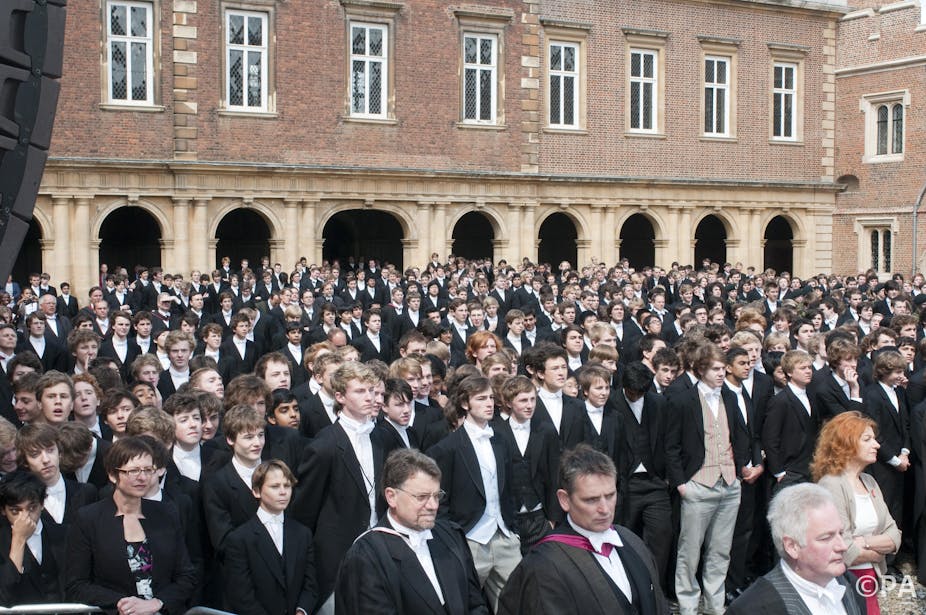The UK’s most prestigious universities are repeatedly accused of discriminating against disadvantaged students in favour of those who are deemed to have a social advantage, and particularly those from independent schools. But while it’s easy to blame this on institutional bias, analysis shows it is down to grades rather than social background alone.
A new report for the Independent Commission on Fees, set up by the Sutton Trust, found that students from the most advantaged areas of the UK are nearly seven times more likely to enter the UK’s top 30 universities than those from the most disadvantaged backgrounds. Refined further for the top 13 universities, advantaged students are nearly ten times more likely to take up a place.
In a recent blog post, the Sutton Trust reported that 30% of comprehensive schools have at most one or two students progressing to the prestigious 24 Russell Group universities in 2011-12. At the same time, the independent schools Westminster, Eton and St Paul’s, together with top state sector colleges Hills Road College, Cambridge and Peter Symond’s College, Winchester got about 260 students into Oxbridge.
Who’s getting in?
Recent research has tried to look at whether prestigious universities are actually shunning students from the state sector in favour of independent school students.
The results from a recent study of over 10,000 university first years using 2011 data from the YouthSight survey, show that a student at a Russell Group university is likely to be from the ABC1 social status group – the highest band in the national A-E scale where “A” represents highest social class and “E” the lowest.
Their parents are most likely to be in professional or senior management jobs, and to have also been to university. Parental education affects college and university choices, and parents who stayed in education longer are more than twice as likely to have children who enter a research university.
But the study results also reveal that students from these groups gain significantly higher qualifications or entry scores based on the University and Colleges Admissions Service (UCAS) points system. UCAS point scores are calculated with A Level grades and equivalent qualifications and are used in the admissions process of UK universities. Although most top universities use A Level grades such as A*AA or AAA rather than UCAS point scores to make offers, these scores still provide a consistent way of measuring pre-university achievement.
Students in the study who attended Russell Group universities had significantly higher UCAS scores than students attending other institutions, which is not surprising because of their higher entry requirements.
But students from private schools also had significantly higher average UCAS scores compared with state sector students: 408.7 points compared with 380.7 for state school teenagers. In contrast, students from disadvantaged backgrounds had significantly lower average UCAS scores – 341.3 – compared to their peers, who had 399.1 points. Black students, another under-represented group at university, also had lower average UCAS scores at 284.88.
Increase attainment from state schools
But universities, including the top ones, are not simply shunning students because of social status or the school they attended. Rather it’s that lower levels of achievement at an earlier stage in students’ schooling prevent many disadvantaged students from achieving the high entry grades required to gain entry to Russell Group and highly ranked universities.
Evidence indicates that efforts need to be made to increase achievement in a wider range of schools, particularly state-funded schools and colleges, to enable talented and highly motivated young people to gain the A and A* grades they need to attend the best institutions.
Private schools reaching out
Some efforts are under way to address these imbalances. First, one of the country’s top private schools, Westminster School, is working with the Harris Federation to jointly open a sixth-form academy which aims to offer pupils from poor backgrounds a route to Oxford and Cambridge.
Second, Eton College also offers their expertise and gives support to more disadvantaged state school students by offering Eton’s boarding house runs a summer school to recreate the Oxbridge experience and improve students’ self-confidence and social skills. The summer school is aimed at state-school pupils who aspire to Oxbridge.
Third, ten leading universities are also working together with the Sutton Trust to offer summer schools to bolster confidence, maximise talent, give practical advice and boost exam scores to enable gifted and motivated young scholars to gain entry to the top institutions. Entry to these summer school programmes is based on strict selection criteria to identify the brightest students from the toughest backgrounds.
The key in all these schemes is to identify and invest in talented young people to give them support to gain the high grades and scores they need to get into top institutions. But it’s also about making sure students have the right guidance and information, and the self-confidence to make a bid to enter our prestigious universities. This is in the best interests of not only the young people themselves, but top institutions who seek to recruit the best qualified students.

